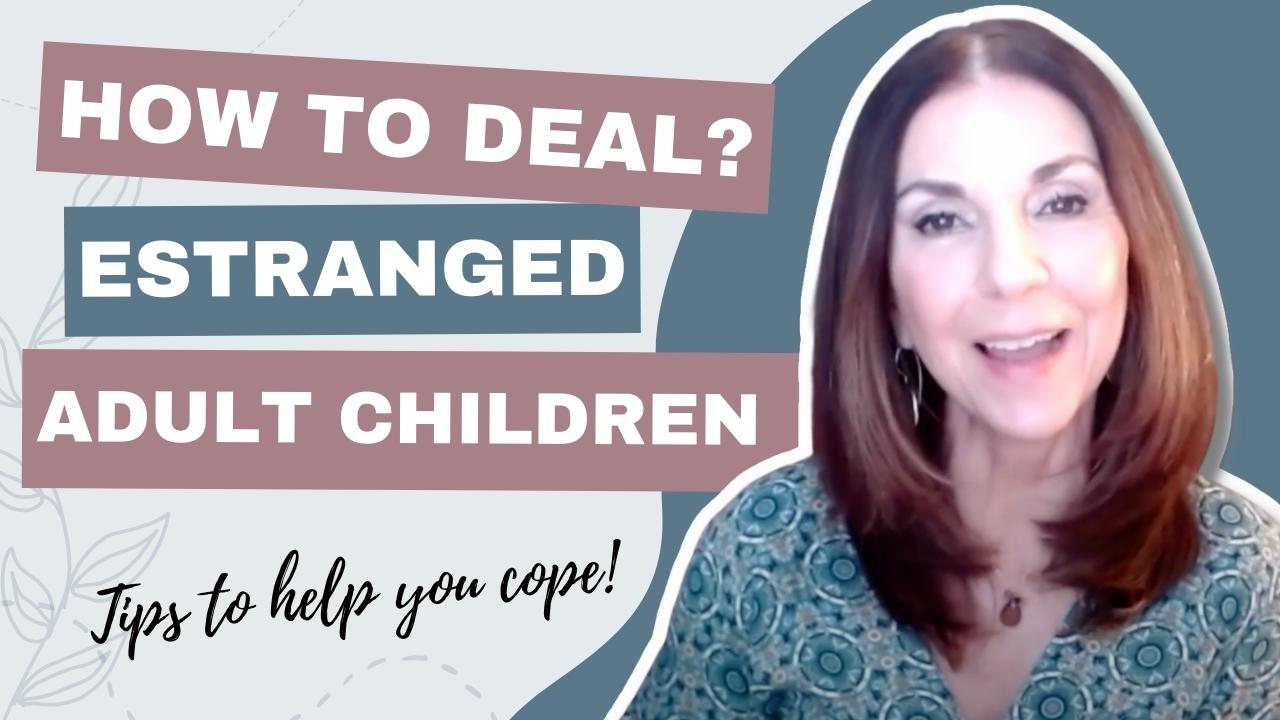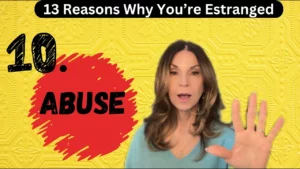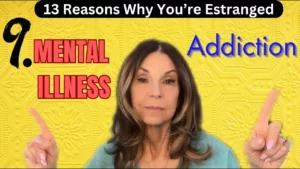Estrangement is the relatively recent term to describe when family members experience physical and or emotional distance from one or more family members. The condition of estrangement hits at least 27% of individuals in the United States. Your adult child’s perspective and decision to cut off is likely an attempt to manage their discomfort.
Primary discomfort factors include reducing conflict, tension, anxiety, differing values, and a general belief that being apart is more desirable than having contact. Your experience can be one of confusion, disappointment, grief, anxiety, and sadness.
This article discusses how to deal with estranged adult children and what to do. You will learn TEN essential tips to build your foundation for coping and a pathway towards possible reconciliation.
Parents wishing to repair and reconcile with their adult child will benefit by preparing to go the distance. Unfortunately, there is no guarantee, no definite timeline, or magic wand. Much of the angst around this condition is the uncertainty. Not knowing what someone is out of your control will decide and when they decide is stressful. Your best method of coping will be to manage and control what you do.
Usually, past behaviors between you and your estranged child were keenly stressful. The roots of your relationship may involve dysfunctional behaviors, harsh parenting, mutual disrespect, substance use, jealousy, favoritism, and sibling hostility. Divorce and the entrance of new people into the family can stress kids at any age. Your child may have grown in an environment with the best intentions, yet they decide you are no longer necessary. Each situation varies greatly; however, chronic stress is a standard feature for estranged parents.
Chronic stress or the condition of emotional upheaval, uncertainty, and intense emotions can negatively impact your well-being. You may be stuck not knowing what to do and how to move forward. Your ten keys will build your internal reservoir so you can feel less stressed. In addition, it will benefit your efforts towards the goal of repairing and resuming your relationship with your adult child.
Ten Keys To Dealing With Estrangement
1. Learn to Find Calm by Taking Your Emotional Temperature.
When we are stressed and upset, we may resort to letting them know a few things in ways that might provoke them. Take your emotional temperature by gauging your level of agitation, anger, hopelessness, and anxiety. You can find calm by doing a breathing technique where you intentionally bring your internal stress level down.
If you’re stressed out, communicating with your adult child will be so much better when you are calm, relaxed, and collected. More importantly, your investment in processing your strong emotions during an emotional visit. Make time for an emotional visit to allow yourself to feel acceptance. It’s uncomfortable to have estrangement in your life. The onslaught of big feelings requires time to sort out your emotions. There is no right or wrong way. Consider making a favorite cup of tea, grab a journal if you like, and let yourself feel. Be compassionate, and if you need to cry, groan, let it be.
Spend as much time as you need; rest when you feel a release. When you are ready, do something you like to do. Then go back to your emotional visit on another day.
This exercise allows you to ventilate. Processing the gravity and loss of estrangement is a necessary step we cannot afford to skip. This exercise will also help you decrease the power of feelings such as guilt and shame. Strong unprocessed feelings keep us stuck. Getting out of the stuck state requires time to process. Essentially, you are helping yourself to grieve and move forward.
2. Sharpen Your Communication Skills
One of the essential skills in dealing with our adult children is learning to validate what they are saying. Validating is simply listening and repeating your words or what you heard. It allows them to know you have listened to them. It is essential not to be defensive or try to convince them they have it all wrong. Validating your adult child does not mean you need to agree with what they say. You make it possible for them to know they are heard.
3. Learn Personal Boundaries
If your adult child acts out and behaves disrespectfully, a clearly stated boundary is necessary. Inform them with as much calm as you can muster that their agitated, demanding, demeaning, and disrespectful behavior makes it very difficult for you to listen and be attentive.
Tell them that you want to hear them, and you want them to be heard. But, you are unwilling to do so when they are hostile and intimidating.
4. Prepare to Make Amends
Making amends and taking responsibility for your part in what they are troubled about requires humility and calm. If they are accusing you of something outlandish that is untrue, you may reply with: “I hear what you are saying, but I did not __________. We can agree to disagree about this. Tell me more about what you are feeling.
Indeed, this requires great skill in keeping calm and open to their perspective.
5. Practice Gratitude
Gratitude is a powerful practice that aligns us into a state of calm and feeling better. The estrangement condition can be horrific. However, there is always much to be grateful for. To move forward and feel less of the painful burden, we can defer to being thankful.
Even if we are grateful to come home to our warm home, food in the fridge, and our furry friend, we can see the glass overflowing instead of empty.
6. Grow Your Empathy Muscle
Your adult child has very different stressors than yours. What might they be experiencing?
If your child’s distancing was very unexpected and you had a good relationship beforehand, something must be upsetting to them.
Indeed, if your adult child is abusive and disrespectful, being empathetic does not mean you condone their behaviors. It does mean you understand that their emotional dysregulation, anger, detachment originated somewhere, and they are suffering too.
7. Practice Self-Care
Your daily self-care routine will help you build your reservoir to prepare you for the uncertain future. A self-care practice is more than a monthly salon visit or a lunch date. Spend time breathing techniques, meditation, eating well, sleeping, and having fun.
Essentially, self-care is a boundary you set for your wellness. Self-care refers to addressing our physical, emotional, spiritual, and relational aspects. When we value our wellness, we do intentional practice to do what is best for us.
8. Do Self-Talk
Make a list of all the good things you have done as a parent and remind yourself often. Remind yourself of the sacrifices you made. Resist the temptation to remind your child.
Do the self-talk by telling yourself that you did the best you could.
When you go down the trap of self-criticism, defer to truthful statements about yourself. “I did the best I could.” “I was there for my child, I provided for them, etc.” Remind yourself you are doing the best you can, and you did the best you could.
9. Get Support
Estrangement is a challenging road to travel, especially alone. Guilt and shame can keep us in a negative rabbit hole of strong feelings we cannot quickly or easily climb out. You may be reticent about sharing since you feel so outcasted. Most people do not share their experiences due to feelings of shame. Having Support, like a therapist or relationship coach, can help you navigate your way towards your goal of reconciling and feeling less discomfort. Likewise, the anxiety and uncertainty can be overwhelming.
Talking to a professional will provide a safe place to ventilate, so you give a safe, non-judgmental space to listen to when you speak to your adult child. You will learn to be more attractive to them by not defending yourself. You may also discover that life goes on despite your adult child’s cutting off.
10. Be Informed
Having information and remaining educated on estrangement will empower you. Your intentional journey towards your goal of reconciling and finding peace will be easier when you are informed. Learn about the condition, learn why adult children cut off, the best communication skills, how to best care for you, and how to lessen your stress. Chronic stress keeps us stuck in a state of discomfort, making it difficult to best deal with our kids. Empower your journey with information, so you are best prepared.
Estrangement hits at least 27% of individuals in the United States. Your experience can be one of confusion, disappointment, grief, anxiety, and sadness. Having the ten keys to dealing with estrangement will help you feel better. This article discusses how to deal with estranged adult children and what to do. Ten essential keys will build your foundation for coping and a pathway towards possibly reconciling.
Get The eBook: Feeling Heartbroken and Alone? How to Pick Up the Pieces When You are Estranged.
Resources:
- Agllias, Kylie. Family Estrangement A Matter Of Perspective. New York, Routledge, 2017.
- Coleman, Joshua. Rules of Estrangement. New York, Harmony Books, 2020.
- Morin, Marie. Feeling Heartbroken and Alone? How to Pick Up the Pieces When You are Estranged. eBook. 2022.
- Morin, M.L. [Morin Holistic Therapy]. (2022, January 4 ). What is Family Estrangement? You Are Not Alone.
- Morin, M.L. [Morin Holistic Therapy]. (2021, September 8). Diaphragmatic Breathing: 5 Minute Deep Breathing Exercise for Beginners.
- Morin, Marie. How to Deal with Estranged Family During the Holidays (2021, November 21) Sixty and Me. https://sixtyandme.com/estranged-family-holidays/
- Pillemer, Karl. Fault Lines Fractured Families and How to Mend Them. New York Penguin Random House, 2020.









